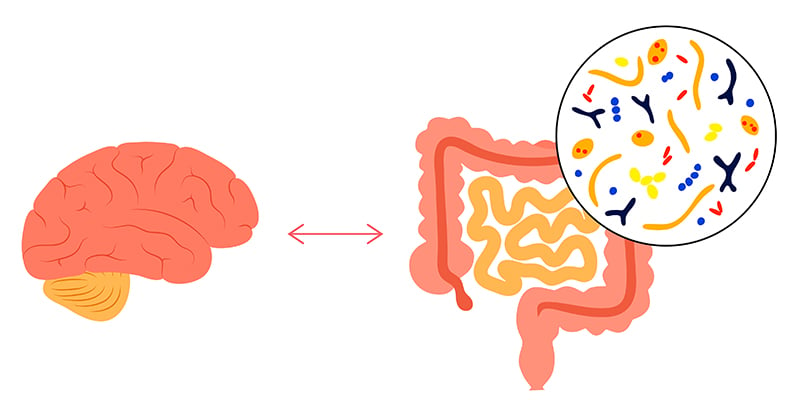
The human gut has been called the “second brain,” and its network is similarly complex. More than 100 million neurons in the gut communicate with the brain (a system known as the gut-brain axis) and influence health or illness. We know that gut health impacts a wide variety of physical processes in the body—it’s been studied for its influence on everything from autism to anxiety. Does it also play a role in Alzheimer’s disease?
GUT BASICS
The gut is heavily involved in human immunity, as the gut houses trillions of beneficial microorganisms designed to fend off disease. This communication is also why maintaining a healthier gut may play a role in combating serious mental health issues like depression.
On the other hand, an unhealthy gut can lead to chronic conditions throughout the body, such as autoimmune diseases, anxiety, and ADD/ADHD. This occurs when numbers of “bad” bacteria (pathogens) in the gut are elevated; generally, a ratio of 85% good bacteria to 15% pathogens is recommended. When the latter level creeps up—a fluctuation that can occur for many reasons, such as medications, stress, illness, aging, and poor diet—an imbalance called dysbiosis takes place, and infections and diseases are more likely to occur. Given the strong link between the gut and the brain, it’s not surprising that researchers are finding that gut dysbiosis may be involved in the development of Alzheimer’s disease.
Given the strong link between the gut and the brain, it's not surprising that researchers are finding that gut dysbiosis may be involved in the development of Alzheimer's disease. Click To TweetTHE LINK BETWEEN ALZHEIMER’S DISEASE AND THE GUT
The Alzheimer’s Association reports that 6.7 million Americans (a number expected to almost double by 2050) are currently living with Alzheimer’s, the most common form of dementia. Alzheimer’s is a degenerative brain disease that leads to diminished memory, thinking, and reasoning skills, as well as personality and mood changes. While there may be a genetic component to developing Alzheimer’s, it’s also impacted by lifestyle choices, such as diet (some researchers have even called Alzheimer’s “type 3 diabetes”) and exercise.
The body, of course, hosts a complex web of interactions and systems that all influence each other. We’ve noted that the gut impacts so many areas of the body (including mental health) due to its link to the immune system and the gut-brain axis. Furthermore, mental health conditions increase the risk of dementia, including Alzheimer’s. With no cure yet for this type of dementia, scientists are looking at the link between dysbiosis and the onset of Alzheimer’s to determine possible treatment options.
One study published in 2021 examined changes in patient’s gut microbiota, as well as the roles and mechanisms of gut pathogens in Alzheimer’s, seeking potential therapies that center around these microbiota. The researchers concluded, “There is no doubt that gut dysbiosis plays a vital role in modulating the microbiota-gut-brain axis and actively participates” in the development of Alzheimer’s disease.
Certain bacteria are believed to be associated with the disease and play a role in affecting brain function; they may foster Alzheimer’s development in a number of ways, including through neuroinflammation, dysregulation of neurotransmitters, and oxidative stress. But the researchers also admitted that additional studies would be needed to learn more about this relationship on the path toward developing methods to prevent or treat the disease.
Another 2021 study came to similar conclusions as it looked at the emerging role of gut microbiota when it comes to modulating neuroinflammation and neurodegeneration, especially as it relates to Alzheimer’s. Noting that dysbiosis can create leaky gut and inflammation within the body, the research team hypothesized that this chain reaction could influence cognitive impairment, thanks to connections between the neural, immune, endocrine, and metabolic pathways.
Finally, a 2022 study on mice also confirmed that the gut microbiome likely “contributes to pathologies…and that dysbiosis of the human microbiome might be a risk factor” for Alzheimer’s. Though these links point to the potential for future treatments, the study also admitted that exact definitions remain murky. For example, even the term “gut dysbiosis” is a general one, without a precise definition—and, likewise, the concept of a healthy microbiome may vary greatly between humans and other animals, among different individuals, or even within the same individual at different stages.
WILL THE GUT POINT THE WAY TO NEW ALZHEIMER’S TREATMENTS?
In a 2022 study, additional researchers noted a “close relationship between gut microbiota composition…and AD onset, usually derived from neuroinflammation caused by bacteria products or bacterial brain migration,” which is a normal process that occurs in order to help the brain form and develop synapses, as well as to influence mood and cognition.
Because nutrition is so important in helping to modulate gut microbiota, the study looked at different diets and their potential impact on Alzheimer’s. For example, a diet rich in polyphenols (antioxidant compounds found in berries, dark chocolate, tea, olive oils, and some herbs and spices) has been associated with a positive influence on microbiota. Other solutions, such as the implementation of vitamin supplements, probiotics, and prebiotics, are still being studied, along with dietary changes, to determine if or how they improve gut health, with the goal of preventing or treating Alzheimer’s.
Another study from 2022 that noted a genetic link between gut disorders and Alzheimer’s stumbled upon a related finding—that elevated levels of cholesterol may increase the risk of both. The team of researchers explained that “high cholesterol can transfer into the central nervous system, resulting in abnormal cholesterol metabolism in the brain,” while other evidence suggests that “abnormal blood lipids may be caused or made worse by gut bacteria,” and elevated cholesterol has been associated with “brain degeneration and subsequent cognitive impairment.” This leads to the question of whether lowering too-high cholesterol can lead to more positive outcomes for Alzheimer’s.
ALZHEIMER’S, GUT-BRAIN HEALTH, AND OUR AGING POPULATION
People are living longer now than ever before. Of course, that’s a good thing, driven by medical advancements and technology. But it also places greater importance on taking care of our bodies—especially our brains—from the earliest age possible, so that we can enjoy our later years as much as our youth. Cognitive decline not only interferes with our ability to perform daily life tasks; it affects our relationships and interactions with the world around us and ultimately has the power to completely change us.
Many people assume that brain-related decline is just a normal part of life, but it doesn’t have to be. It simply underlines how crucial it is for us to take steps every day toward better brain health. That includes everything from avoiding brain injuries and toxic substances like cigarettes and alcohol to eating a healthy diet. It also means considering early screening—such as neuropsychological testing and brain SPECT imaging—if you have a genetic predisposition for Alzheimer’s or if you’re concerned about your memory. As scientists continue to gather an increasing body of knowledge about the brain-gut axis and its impact on Alzheimer’s, you can start creating your own mechanisms of protection and prevention to encourage better brain outcomes well into your later years.
Memory loss, cognitive decline, and other mental health issues can’t wait. At Amen Clinics, we’re here for you. We offer in-clinic brain scanning and appointments, as well as mental telehealth, clinical evaluations, and therapy for adults, teens, children, and couples. Find out more by speaking to a specialist today at 888-288-9834 or visit our contact page here.





Very informative article. It does make sense how our bodies work including the gut. Have high cholesterol and have been trying to lower it naturally. Will be more diligent to lower my cholesterol.
Comment by Kathy — June 26, 2023 @ 6:13 AM
wonderful article!
Comment by Doug Morris — July 19, 2023 @ 4:37 PM
How much is this product ?
Comment by Linda — July 19, 2023 @ 4:42 PM